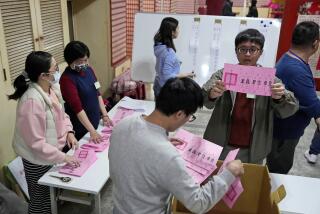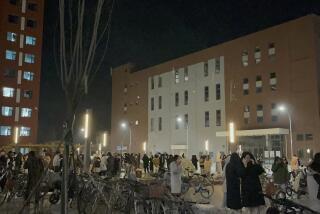China tightens media limits loosened in quake
- Share via
DUJIANGYAN, CHINA — China has begun rolling back many of the media and online freedoms that were permitted in the immediate aftermath of last month’s earthquake.
Restrictions on foreign and domestic reporters have been tightened in recent days. Web discussion groups have seen postings deleted. Internet filtering has been stepped up.
The propaganda ministry and the State Council, China’s Cabinet, have issued directives to state-run news media outlining forbidden topics. Among them: questions about school construction, whether government rescue efforts lagged and whether Beijing knew in advance that the earthquake would happen but failed to warn people. Although the latter issue is scientifically questionable, it has nonetheless transfixed millions of Chinese Internet users.
The tough stance, which has included crackdowns on public protest, reflects in part the changing nature of the story surrounding the magnitude 7.9 temblor that left about 70,000 people dead in Sichuan province, media analysts say.
In the first weeks after the quake, the main narrative was the heroic efforts of rescue workers, the plight of trapped victims and the shock to a nation. The positive story line helped unify the people and helped humanize China’s image abroad when it was struggling to recover from criticism of its crackdown in Tibet and surrounding regions.
Now, however, the disaster has entered a more politically complex stage as national and foreign criticism mounts over issues of corruption, embezzlement and the government’s response to the large number of schools that collapsed.
Amid the unimaginable human suffering, media analysts said, the government is carefully calculating how much freedom it will allow and what message to convey. As it does, it is embracing sophisticated media management techniques and easing away from the far more heavy-handed methods of the past.
In one apparent bid to chill coverage, the state-run New China News Agency and a prominent TV host have sharply criticized an investigative newspaper that has run stories on local officials saving themselves first and on a provincial education official acknowledging that poor school construction was a factor in the high death rate among children.
The news agency ran a prominent commentary accusing the Southern Weekend paper, based in the southern province of Guangdong, of using “tinted glasses to view China.”
Officials are also urging the media to “emphasize positive propaganda” and “uphold unity, stability and encouragement.”
Here in Dujiangyan, police briefly detained several journalists Tuesday and hauled away 100 parents who had threatened to file a lawsuit against local officials over poor construction standards at Ju- yuan Middle School, where several hundred students died, the Associated Press reported.
On Wednesday, police and paramilitary blocked access by the news media and local residents to the school, which had crumbled even as most nearby buildings remained standing.
A neighbor surnamed Gong who declined to give his first name, citing fears of government retribution, said that authorities had repeatedly prevented angry parents from gathering at the site. “The government really didn’t do enough to rescue them, and the construction quality was very bad,” he said.
Beijing has called for an investigation of shoddy construction. It remains to be seen, however, whether it will side with the parents and launch a meaningful anti-corruption inquiry or whitewash the problem and shield wrongdoing.
Ultimately, some analysts said, Beijing is fighting a losing battle in attempting to stifle the media, Web traffic and broader human rights. Reporters and editors in the last several weeks have gotten a taste of covering news under relatively free conditions. That will encourage many to push the limits.
The public, for its part, has gotten a taste of vivid, dramatic reporting that contrasts sharply with much of the traditionally staid fare.
“What’s happened is historic,” said Ying Chan, journalism school dean at Shantou University in Guangdong. “Life has been transformed. . . . It’s like the Vietnam War, which for the first time brought battle live into people’s living rooms. They’ll rein it in, but you can never go completely back.”
Even as it cracks down, however, China is mixing Western public relations techniques into its media approach.
“They’ve learned spin tactics from America, Europe, U.S. political ads,” said Xiao Qiang, director of the China Internet Project at UC Berkeley. “They’ve become quite sophisticated.”
As part of its so-called main melody strategy, the propaganda ministry is willing to allow more “discordant notes” and critical opinions on the Internet as long as the party line is predominant. It also has become more adept at distraction.
Fanning recent comments by actress Sharon Stone that the May 12 earthquake was the result of “bad karma” linked to its Tibet policy has helped divert attention from the school corruption issue, analysts said.
“They increasingly recognize they can’t control everything, and pick and choose,” said Rebecca MacKinnon, a journalism professor at the University of Hong Kong. “The government has come to realize, rather than block outside information, you can perhaps just discredit it.”
And Beijing is making more use of good-cop, bad-cop tactics. On the issue of Tibet, for instance, some arms of the government decried the Dalai Lama, the exiled Tibetan spiritual leader, even as other parts called for negotiations.
It also has granted unprecedented access to the foreign media when it is advantageous. During the initial stages of the earthquake coverage, it allowed foreign reporters to visit rural disaster areas, even at one point ferrying them to sites on a military helicopter -- unheard of in a country where not too long ago many Western reporters were viewed as spies. The subsequent coverage led to a huge inflow of foreign donations and a more human face abroad.
China’s propaganda machine also is becoming faster and more effective in responding to lively local media and citizen journalists. Late last month, blogger “Peaceful Heart” wrote that emergency tents were being appropriated by well-connected residents of undamaged neighborhoods in Chengdu, the capital of Sichuan. As public outrage spread, the government mounted an investigation and launched a campaign against misuse of aid.
The recent tightening of media control is far from uniform, with a foreign reporter able to speak with residents around Juyuan Middle School on Wednesday in the presence of numerous police and paramilitary officers without a problem.
In a nation that often appears monolithic from the outside, the crisis has intensified an internal debate over information policy, analysts say.
Those in the more hard-line propaganda ministry favor tighter control. The somewhat reform-oriented State Council, meanwhile, advocates a more open approach. In something of a milestone, the earthquake crisis led to the first live news conference by top military brass, organized by the State Council.
“The school issue is very sensitive, and they’re trying to put a lid on it,” UC Berkeley’s Xiao said. “But the issue is too big. They can’t put it back in the box.”
--
More to Read
Sign up for Essential California
The most important California stories and recommendations in your inbox every morning.
You may occasionally receive promotional content from the Los Angeles Times.













